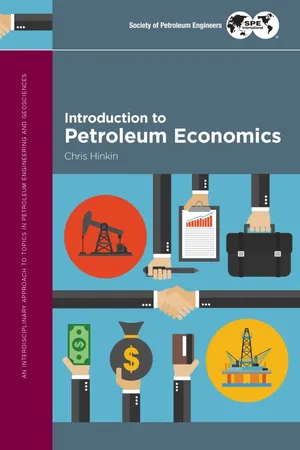
- English
- ePUB (mobile friendly)
- Available on iOS & Android
eBook - ePub
Introduction to Petroleum Economics
About this book
Introduction to Petroleum Economicsis about the process of gathering project data, calculating whether a project should proceed and delivering recommendations. It discusses the science of petroleum economics, starting from square-one, the tools of the trade that petroleum economists use, day in and day out, and also its application. Along the way the author relates some helpful and informative anecdotes based on his almost twenty-year career as a petroleum economist. Vital for all oil professionals as well as students, Introduction to Petroleum Economicsunravels the decision-making behind why a petroleum project moves ahead or ends.
Frequently asked questions
Yes, you can cancel anytime from the Subscription tab in your account settings on the Perlego website. Your subscription will stay active until the end of your current billing period. Learn how to cancel your subscription.
No, books cannot be downloaded as external files, such as PDFs, for use outside of Perlego. However, you can download books within the Perlego app for offline reading on mobile or tablet. Learn more here.
Perlego offers two plans: Essential and Complete
- Essential is ideal for learners and professionals who enjoy exploring a wide range of subjects. Access the Essential Library with 800,000+ trusted titles and best-sellers across business, personal growth, and the humanities. Includes unlimited reading time and Standard Read Aloud voice.
- Complete: Perfect for advanced learners and researchers needing full, unrestricted access. Unlock 1.4M+ books across hundreds of subjects, including academic and specialized titles. The Complete Plan also includes advanced features like Premium Read Aloud and Research Assistant.
We are an online textbook subscription service, where you can get access to an entire online library for less than the price of a single book per month. With over 1 million books across 1000+ topics, we’ve got you covered! Learn more here.
Look out for the read-aloud symbol on your next book to see if you can listen to it. The read-aloud tool reads text aloud for you, highlighting the text as it is being read. You can pause it, speed it up and slow it down. Learn more here.
Yes! You can use the Perlego app on both iOS or Android devices to read anytime, anywhere — even offline. Perfect for commutes or when you’re on the go.
Please note we cannot support devices running on iOS 13 and Android 7 or earlier. Learn more about using the app.
Please note we cannot support devices running on iOS 13 and Android 7 or earlier. Learn more about using the app.
Yes, you can access Introduction to Petroleum Economics by Chris Hinkin in PDF and/or ePUB format. We have over one million books available in our catalogue for you to explore.
Information
Publisher
Society of Petroleum EngineersYear
2017eBook ISBN
9781613994931Edition
0Table of contents
- Cover
- Title Page
- Copyright
- Acknowledgments
- Dedication
- Foreword
- Contents
- Preface
- Introduction
- Some Housekeeping
- Chapter 1: Introducing Cash Flow
- Chapter 2: What Is It About Cash Flow?
- Chapter 3: The Relevant Cash Flows Oil Companies “Know”
- Chapter 4: The Relevant Cash Flows Oil Companies Have to Calculate
- Chapter 5: Net Cash Flow
- Chapter 6: Introducing Discounting
- Interlude
- Chapter 7: Cash Flows in Practice
- Chapter 8: More on Discounting
- Chapter 9: Other Financial Measures
- Chapter 10: Inflation and Real and Nominal Cash Flows
- Chapter 11: Foreign Exchange Rates
- Chapter 12: Building and Using Discounted Cash Flow Models
- Chapter 13: Incremental Economics
- Chapter 14: Exploration
- Chapter 15: Sensitivity Analysis
- Chapter 16: Acquisitions and Divestments
- Chapter 17: Lease vs. Purchase Decisions
- Chapter 18: Presenting Your Work
- Chapter 19: Going About Your Business
- Chapter 20: Some Advice for Non-professional Petroleum Economists
- Chapter 21: A Final Word
- Appendices
- Index